Transition to Graduate Nursing Practice: Challenges and Strategies
VerifiedAdded on 2023/06/03
|7
|2299
|326
Essay
AI Summary
This essay explores the challenging transition from nursing student to professional nurse, highlighting the initial enthusiasm often overshadowed by work pressure and lack of organizational support. It discusses the reality shock experienced by new graduates due to deficiencies in practical insights, leading to doubts in disease diagnosis and ethical dilemmas. The essay analyzes clinical and non-clinical activities of newly registered nurses, examining the benefits and risks of competency-based education (CBE) and orientation programs. It also reflects on the importance of developmental planning, lifestyle management, and continuous learning through programs like Nursing Entry to Practice (NETP) to mitigate transition shock and improve patient care. The conclusion emphasizes the need for comprehensive support systems to address the high turnover rate and ensure quality medical service delivery by well-trained nursing professionals. Desklib offers more resources for nursing students.
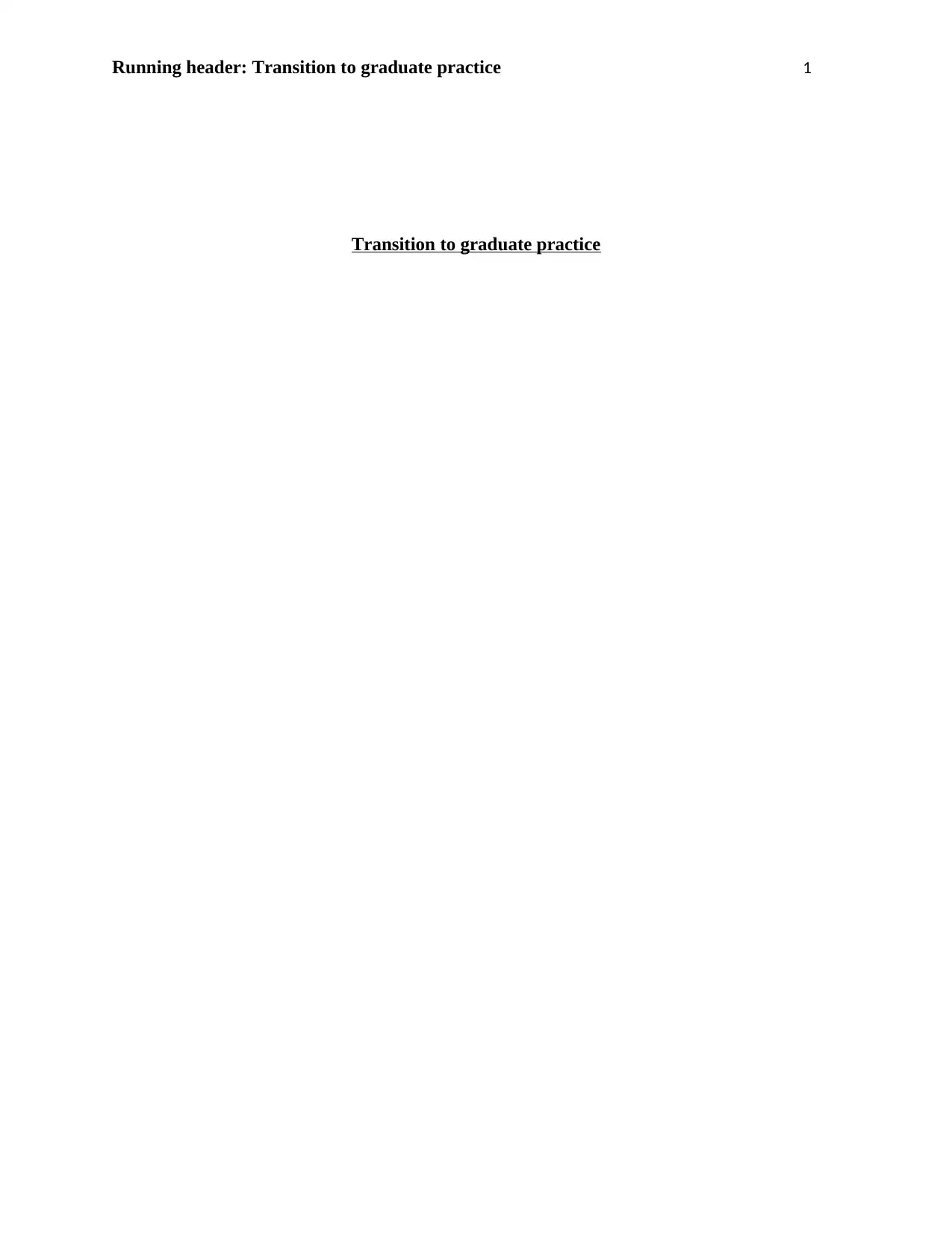
Running header: Transition to graduate practice 1
Transition to graduate practice
Transition to graduate practice
Paraphrase This Document
Need a fresh take? Get an instant paraphrase of this document with our AI Paraphraser
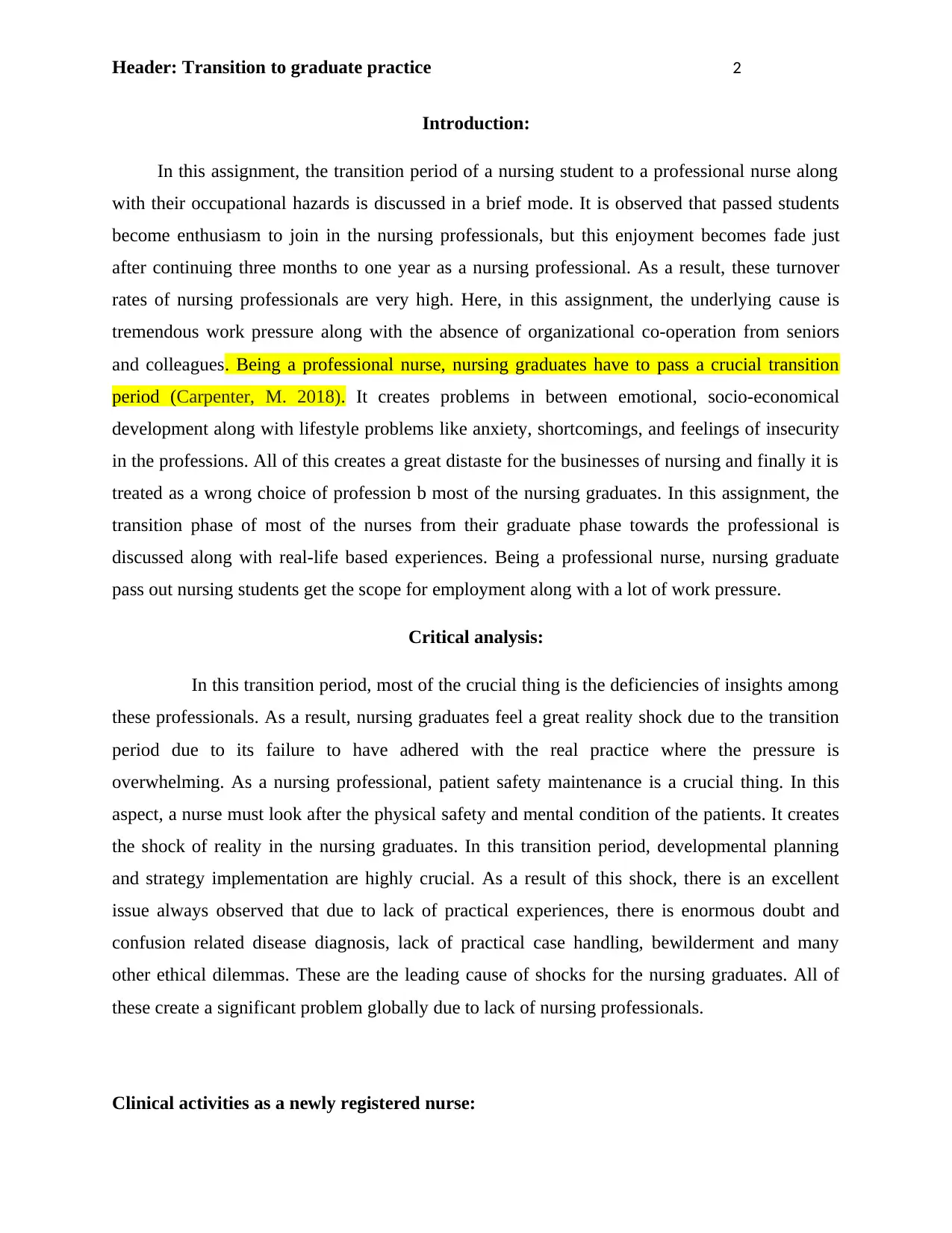
Header: Transition to graduate practice 2
Introduction:
In this assignment, the transition period of a nursing student to a professional nurse along
with their occupational hazards is discussed in a brief mode. It is observed that passed students
become enthusiasm to join in the nursing professionals, but this enjoyment becomes fade just
after continuing three months to one year as a nursing professional. As a result, these turnover
rates of nursing professionals are very high. Here, in this assignment, the underlying cause is
tremendous work pressure along with the absence of organizational co-operation from seniors
and colleagues. Being a professional nurse, nursing graduates have to pass a crucial transition
period (Carpenter, M. 2018). It creates problems in between emotional, socio-economical
development along with lifestyle problems like anxiety, shortcomings, and feelings of insecurity
in the professions. All of this creates a great distaste for the businesses of nursing and finally it is
treated as a wrong choice of profession b most of the nursing graduates. In this assignment, the
transition phase of most of the nurses from their graduate phase towards the professional is
discussed along with real-life based experiences. Being a professional nurse, nursing graduate
pass out nursing students get the scope for employment along with a lot of work pressure.
Critical analysis:
In this transition period, most of the crucial thing is the deficiencies of insights among
these professionals. As a result, nursing graduates feel a great reality shock due to the transition
period due to its failure to have adhered with the real practice where the pressure is
overwhelming. As a nursing professional, patient safety maintenance is a crucial thing. In this
aspect, a nurse must look after the physical safety and mental condition of the patients. It creates
the shock of reality in the nursing graduates. In this transition period, developmental planning
and strategy implementation are highly crucial. As a result of this shock, there is an excellent
issue always observed that due to lack of practical experiences, there is enormous doubt and
confusion related disease diagnosis, lack of practical case handling, bewilderment and many
other ethical dilemmas. These are the leading cause of shocks for the nursing graduates. All of
these create a significant problem globally due to lack of nursing professionals.
Clinical activities as a newly registered nurse:
Introduction:
In this assignment, the transition period of a nursing student to a professional nurse along
with their occupational hazards is discussed in a brief mode. It is observed that passed students
become enthusiasm to join in the nursing professionals, but this enjoyment becomes fade just
after continuing three months to one year as a nursing professional. As a result, these turnover
rates of nursing professionals are very high. Here, in this assignment, the underlying cause is
tremendous work pressure along with the absence of organizational co-operation from seniors
and colleagues. Being a professional nurse, nursing graduates have to pass a crucial transition
period (Carpenter, M. 2018). It creates problems in between emotional, socio-economical
development along with lifestyle problems like anxiety, shortcomings, and feelings of insecurity
in the professions. All of this creates a great distaste for the businesses of nursing and finally it is
treated as a wrong choice of profession b most of the nursing graduates. In this assignment, the
transition phase of most of the nurses from their graduate phase towards the professional is
discussed along with real-life based experiences. Being a professional nurse, nursing graduate
pass out nursing students get the scope for employment along with a lot of work pressure.
Critical analysis:
In this transition period, most of the crucial thing is the deficiencies of insights among
these professionals. As a result, nursing graduates feel a great reality shock due to the transition
period due to its failure to have adhered with the real practice where the pressure is
overwhelming. As a nursing professional, patient safety maintenance is a crucial thing. In this
aspect, a nurse must look after the physical safety and mental condition of the patients. It creates
the shock of reality in the nursing graduates. In this transition period, developmental planning
and strategy implementation are highly crucial. As a result of this shock, there is an excellent
issue always observed that due to lack of practical experiences, there is enormous doubt and
confusion related disease diagnosis, lack of practical case handling, bewilderment and many
other ethical dilemmas. These are the leading cause of shocks for the nursing graduates. All of
these create a significant problem globally due to lack of nursing professionals.
Clinical activities as a newly registered nurse:
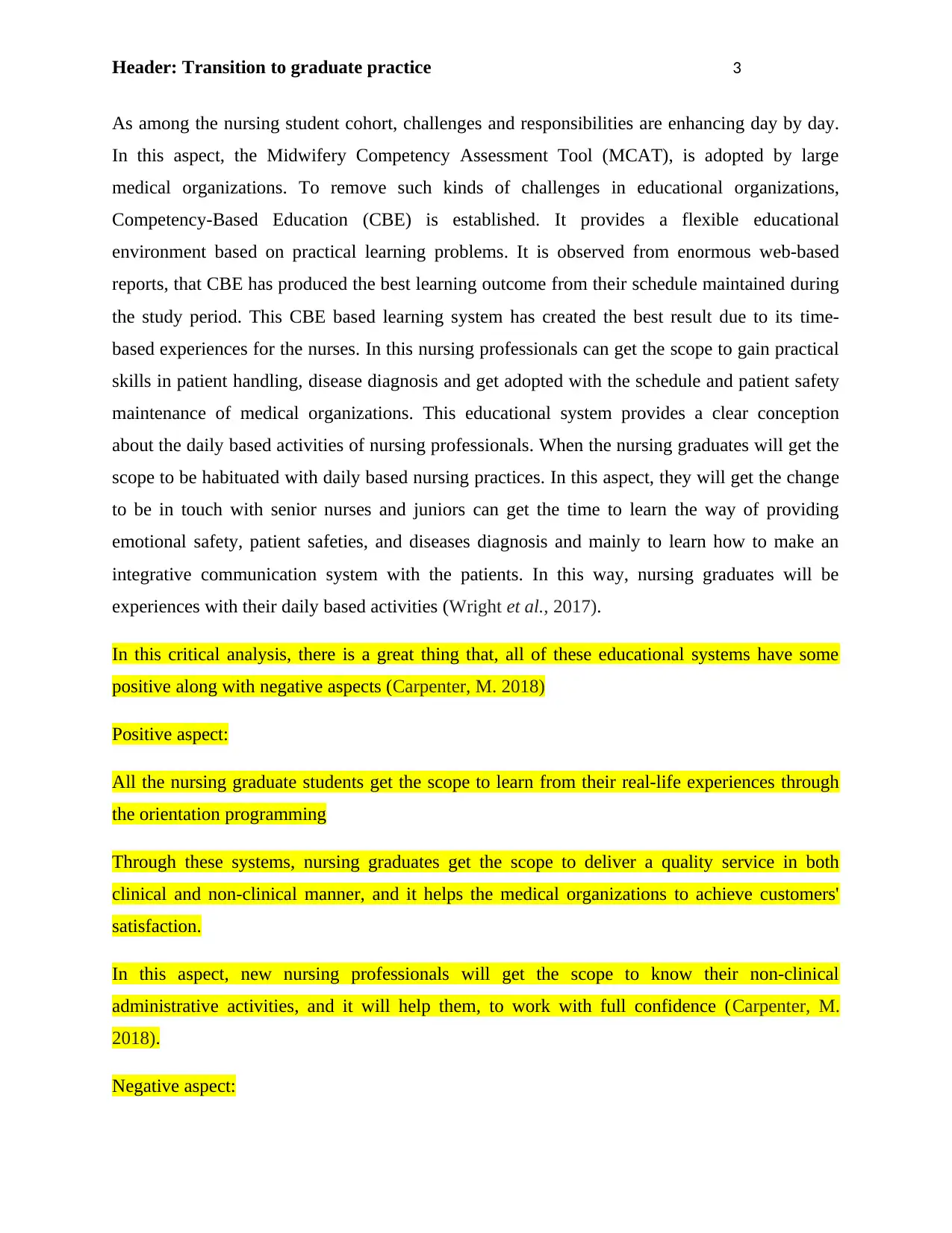
Header: Transition to graduate practice 3
As among the nursing student cohort, challenges and responsibilities are enhancing day by day.
In this aspect, the Midwifery Competency Assessment Tool (MCAT), is adopted by large
medical organizations. To remove such kinds of challenges in educational organizations,
Competency-Based Education (CBE) is established. It provides a flexible educational
environment based on practical learning problems. It is observed from enormous web-based
reports, that CBE has produced the best learning outcome from their schedule maintained during
the study period. This CBE based learning system has created the best result due to its time-
based experiences for the nurses. In this nursing professionals can get the scope to gain practical
skills in patient handling, disease diagnosis and get adopted with the schedule and patient safety
maintenance of medical organizations. This educational system provides a clear conception
about the daily based activities of nursing professionals. When the nursing graduates will get the
scope to be habituated with daily based nursing practices. In this aspect, they will get the change
to be in touch with senior nurses and juniors can get the time to learn the way of providing
emotional safety, patient safeties, and diseases diagnosis and mainly to learn how to make an
integrative communication system with the patients. In this way, nursing graduates will be
experiences with their daily based activities (Wright et al., 2017).
In this critical analysis, there is a great thing that, all of these educational systems have some
positive along with negative aspects (Carpenter, M. 2018)
Positive aspect:
All the nursing graduate students get the scope to learn from their real-life experiences through
the orientation programming
Through these systems, nursing graduates get the scope to deliver a quality service in both
clinical and non-clinical manner, and it helps the medical organizations to achieve customers'
satisfaction.
In this aspect, new nursing professionals will get the scope to know their non-clinical
administrative activities, and it will help them, to work with full confidence (Carpenter, M.
2018).
Negative aspect:
As among the nursing student cohort, challenges and responsibilities are enhancing day by day.
In this aspect, the Midwifery Competency Assessment Tool (MCAT), is adopted by large
medical organizations. To remove such kinds of challenges in educational organizations,
Competency-Based Education (CBE) is established. It provides a flexible educational
environment based on practical learning problems. It is observed from enormous web-based
reports, that CBE has produced the best learning outcome from their schedule maintained during
the study period. This CBE based learning system has created the best result due to its time-
based experiences for the nurses. In this nursing professionals can get the scope to gain practical
skills in patient handling, disease diagnosis and get adopted with the schedule and patient safety
maintenance of medical organizations. This educational system provides a clear conception
about the daily based activities of nursing professionals. When the nursing graduates will get the
scope to be habituated with daily based nursing practices. In this aspect, they will get the change
to be in touch with senior nurses and juniors can get the time to learn the way of providing
emotional safety, patient safeties, and diseases diagnosis and mainly to learn how to make an
integrative communication system with the patients. In this way, nursing graduates will be
experiences with their daily based activities (Wright et al., 2017).
In this critical analysis, there is a great thing that, all of these educational systems have some
positive along with negative aspects (Carpenter, M. 2018)
Positive aspect:
All the nursing graduate students get the scope to learn from their real-life experiences through
the orientation programming
Through these systems, nursing graduates get the scope to deliver a quality service in both
clinical and non-clinical manner, and it helps the medical organizations to achieve customers'
satisfaction.
In this aspect, new nursing professionals will get the scope to know their non-clinical
administrative activities, and it will help them, to work with full confidence (Carpenter, M.
2018).
Negative aspect:
⊘ This is a preview!⊘
Do you want full access?
Subscribe today to unlock all pages.

Trusted by 1+ million students worldwide
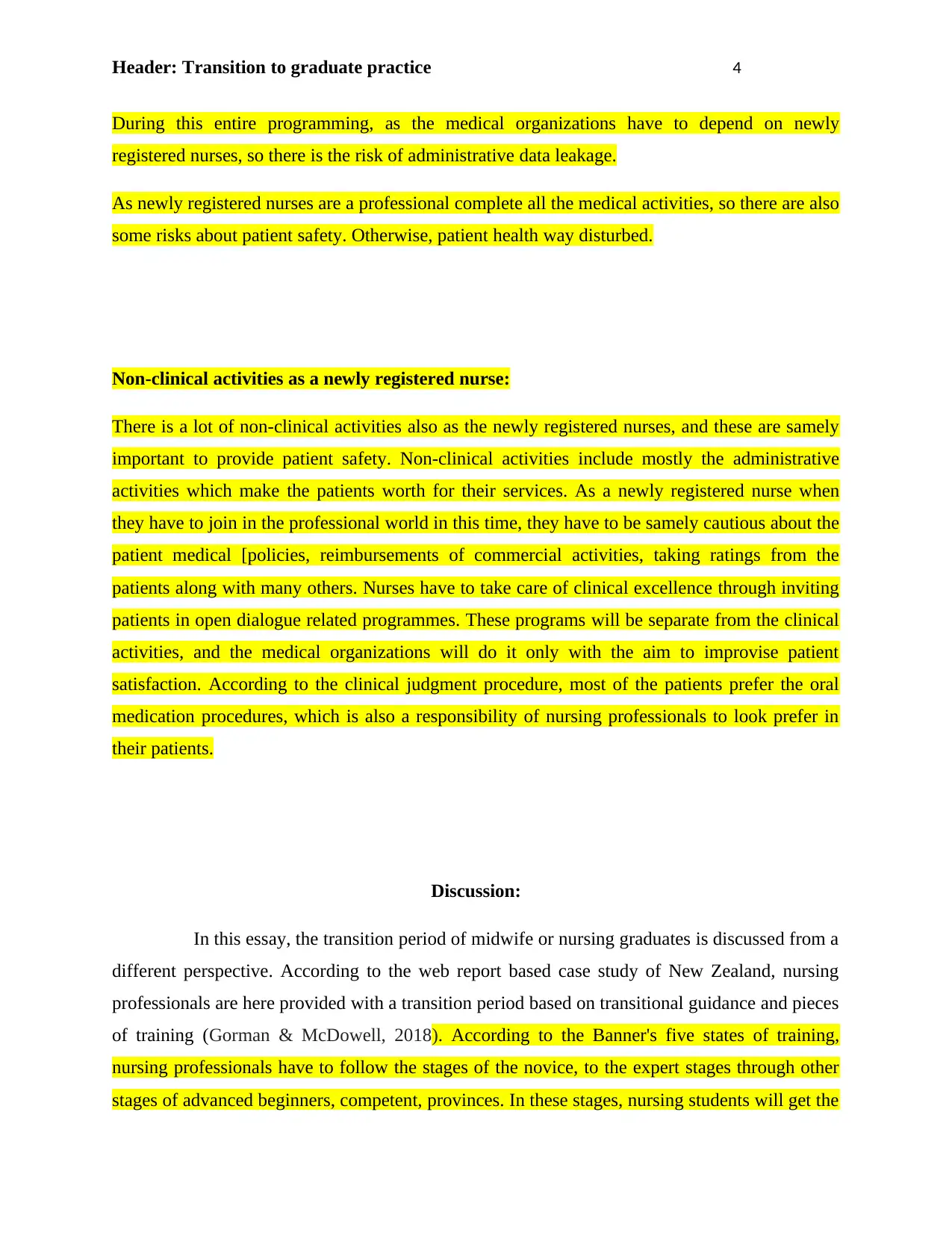
Header: Transition to graduate practice 4
During this entire programming, as the medical organizations have to depend on newly
registered nurses, so there is the risk of administrative data leakage.
As newly registered nurses are a professional complete all the medical activities, so there are also
some risks about patient safety. Otherwise, patient health way disturbed.
Non-clinical activities as a newly registered nurse:
There is a lot of non-clinical activities also as the newly registered nurses, and these are samely
important to provide patient safety. Non-clinical activities include mostly the administrative
activities which make the patients worth for their services. As a newly registered nurse when
they have to join in the professional world in this time, they have to be samely cautious about the
patient medical [policies, reimbursements of commercial activities, taking ratings from the
patients along with many others. Nurses have to take care of clinical excellence through inviting
patients in open dialogue related programmes. These programs will be separate from the clinical
activities, and the medical organizations will do it only with the aim to improvise patient
satisfaction. According to the clinical judgment procedure, most of the patients prefer the oral
medication procedures, which is also a responsibility of nursing professionals to look prefer in
their patients.
Discussion:
In this essay, the transition period of midwife or nursing graduates is discussed from a
different perspective. According to the web report based case study of New Zealand, nursing
professionals are here provided with a transition period based on transitional guidance and pieces
of training (Gorman & McDowell, 2018). According to the Banner's five states of training,
nursing professionals have to follow the stages of the novice, to the expert stages through other
stages of advanced beginners, competent, provinces. In these stages, nursing students will get the
During this entire programming, as the medical organizations have to depend on newly
registered nurses, so there is the risk of administrative data leakage.
As newly registered nurses are a professional complete all the medical activities, so there are also
some risks about patient safety. Otherwise, patient health way disturbed.
Non-clinical activities as a newly registered nurse:
There is a lot of non-clinical activities also as the newly registered nurses, and these are samely
important to provide patient safety. Non-clinical activities include mostly the administrative
activities which make the patients worth for their services. As a newly registered nurse when
they have to join in the professional world in this time, they have to be samely cautious about the
patient medical [policies, reimbursements of commercial activities, taking ratings from the
patients along with many others. Nurses have to take care of clinical excellence through inviting
patients in open dialogue related programmes. These programs will be separate from the clinical
activities, and the medical organizations will do it only with the aim to improvise patient
satisfaction. According to the clinical judgment procedure, most of the patients prefer the oral
medication procedures, which is also a responsibility of nursing professionals to look prefer in
their patients.
Discussion:
In this essay, the transition period of midwife or nursing graduates is discussed from a
different perspective. According to the web report based case study of New Zealand, nursing
professionals are here provided with a transition period based on transitional guidance and pieces
of training (Gorman & McDowell, 2018). According to the Banner's five states of training,
nursing professionals have to follow the stages of the novice, to the expert stages through other
stages of advanced beginners, competent, provinces. In these stages, nursing students will get the
Paraphrase This Document
Need a fresh take? Get an instant paraphrase of this document with our AI Paraphraser
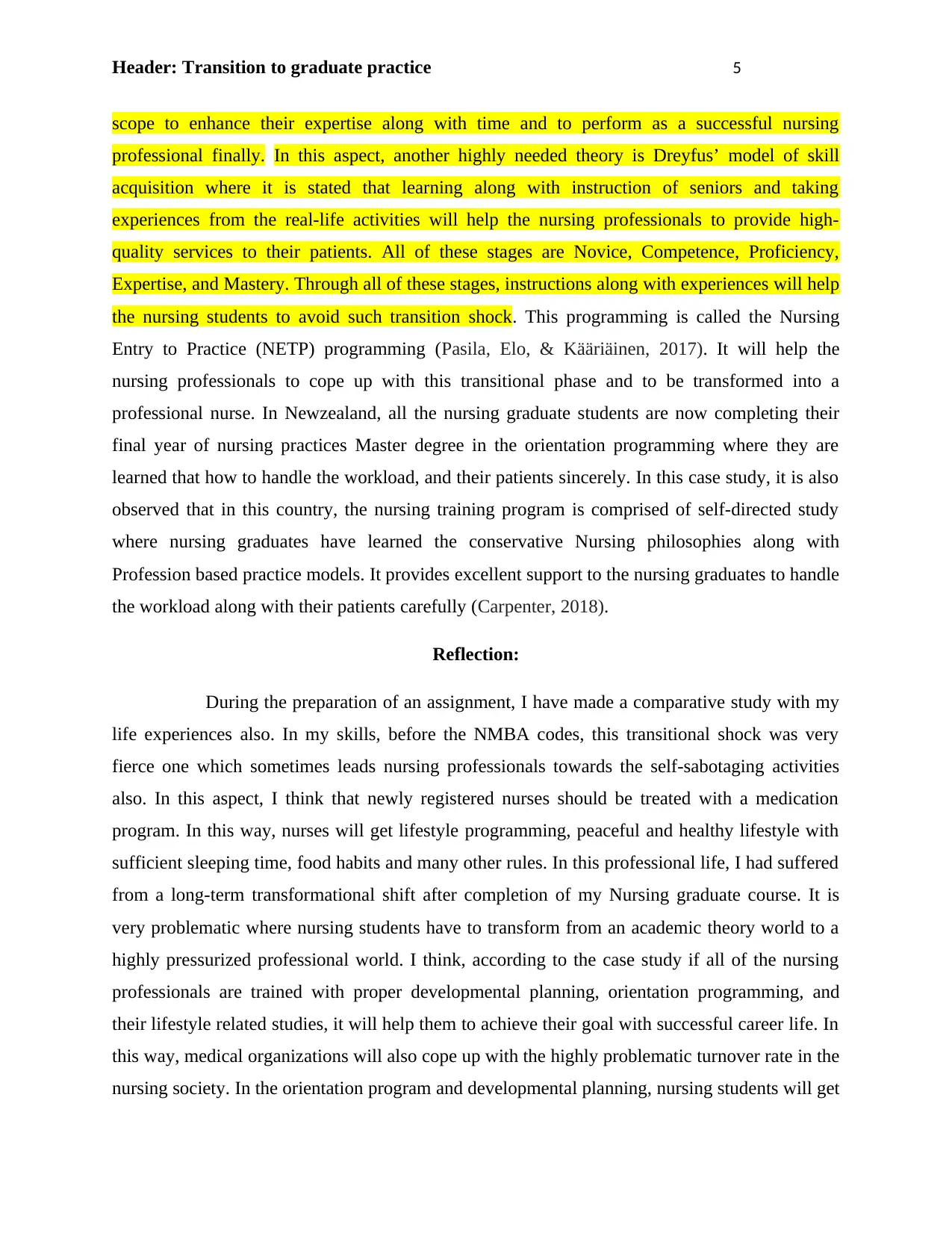
Header: Transition to graduate practice 5
scope to enhance their expertise along with time and to perform as a successful nursing
professional finally. In this aspect, another highly needed theory is Dreyfus’ model of skill
acquisition where it is stated that learning along with instruction of seniors and taking
experiences from the real-life activities will help the nursing professionals to provide high-
quality services to their patients. All of these stages are Novice, Competence, Proficiency,
Expertise, and Mastery. Through all of these stages, instructions along with experiences will help
the nursing students to avoid such transition shock. This programming is called the Nursing
Entry to Practice (NETP) programming (Pasila, Elo, & Kääriäinen, 2017). It will help the
nursing professionals to cope up with this transitional phase and to be transformed into a
professional nurse. In Newzealand, all the nursing graduate students are now completing their
final year of nursing practices Master degree in the orientation programming where they are
learned that how to handle the workload, and their patients sincerely. In this case study, it is also
observed that in this country, the nursing training program is comprised of self-directed study
where nursing graduates have learned the conservative Nursing philosophies along with
Profession based practice models. It provides excellent support to the nursing graduates to handle
the workload along with their patients carefully (Carpenter, 2018).
Reflection:
During the preparation of an assignment, I have made a comparative study with my
life experiences also. In my skills, before the NMBA codes, this transitional shock was very
fierce one which sometimes leads nursing professionals towards the self-sabotaging activities
also. In this aspect, I think that newly registered nurses should be treated with a medication
program. In this way, nurses will get lifestyle programming, peaceful and healthy lifestyle with
sufficient sleeping time, food habits and many other rules. In this professional life, I had suffered
from a long-term transformational shift after completion of my Nursing graduate course. It is
very problematic where nursing students have to transform from an academic theory world to a
highly pressurized professional world. I think, according to the case study if all of the nursing
professionals are trained with proper developmental planning, orientation programming, and
their lifestyle related studies, it will help them to achieve their goal with successful career life. In
this way, medical organizations will also cope up with the highly problematic turnover rate in the
nursing society. In the orientation program and developmental planning, nursing students will get
scope to enhance their expertise along with time and to perform as a successful nursing
professional finally. In this aspect, another highly needed theory is Dreyfus’ model of skill
acquisition where it is stated that learning along with instruction of seniors and taking
experiences from the real-life activities will help the nursing professionals to provide high-
quality services to their patients. All of these stages are Novice, Competence, Proficiency,
Expertise, and Mastery. Through all of these stages, instructions along with experiences will help
the nursing students to avoid such transition shock. This programming is called the Nursing
Entry to Practice (NETP) programming (Pasila, Elo, & Kääriäinen, 2017). It will help the
nursing professionals to cope up with this transitional phase and to be transformed into a
professional nurse. In Newzealand, all the nursing graduate students are now completing their
final year of nursing practices Master degree in the orientation programming where they are
learned that how to handle the workload, and their patients sincerely. In this case study, it is also
observed that in this country, the nursing training program is comprised of self-directed study
where nursing graduates have learned the conservative Nursing philosophies along with
Profession based practice models. It provides excellent support to the nursing graduates to handle
the workload along with their patients carefully (Carpenter, 2018).
Reflection:
During the preparation of an assignment, I have made a comparative study with my
life experiences also. In my skills, before the NMBA codes, this transitional shock was very
fierce one which sometimes leads nursing professionals towards the self-sabotaging activities
also. In this aspect, I think that newly registered nurses should be treated with a medication
program. In this way, nurses will get lifestyle programming, peaceful and healthy lifestyle with
sufficient sleeping time, food habits and many other rules. In this professional life, I had suffered
from a long-term transformational shift after completion of my Nursing graduate course. It is
very problematic where nursing students have to transform from an academic theory world to a
highly pressurized professional world. I think, according to the case study if all of the nursing
professionals are trained with proper developmental planning, orientation programming, and
their lifestyle related studies, it will help them to achieve their goal with successful career life. In
this way, medical organizations will also cope up with the highly problematic turnover rate in the
nursing society. In the orientation program and developmental planning, nursing students will get
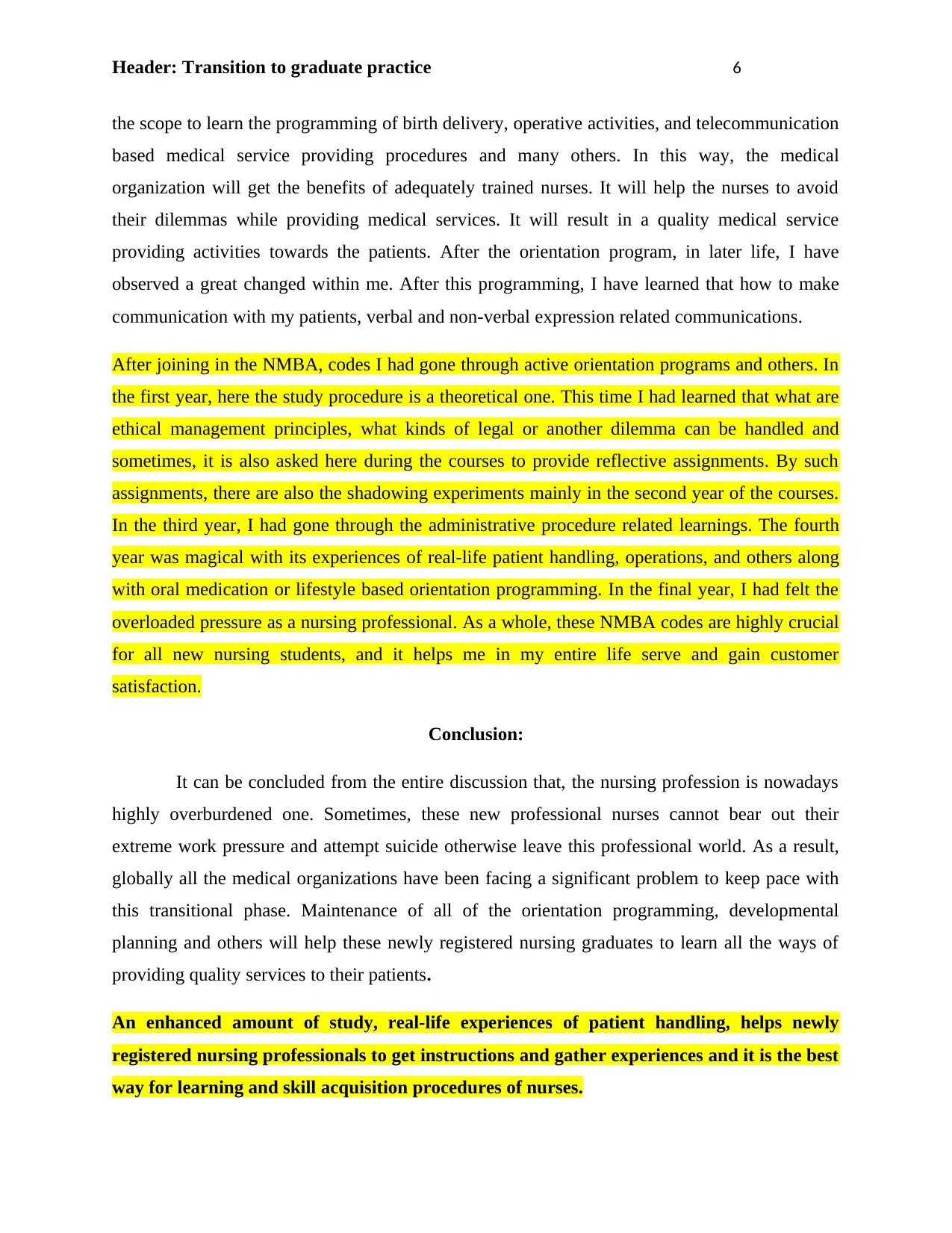
Header: Transition to graduate practice 6
the scope to learn the programming of birth delivery, operative activities, and telecommunication
based medical service providing procedures and many others. In this way, the medical
organization will get the benefits of adequately trained nurses. It will help the nurses to avoid
their dilemmas while providing medical services. It will result in a quality medical service
providing activities towards the patients. After the orientation program, in later life, I have
observed a great changed within me. After this programming, I have learned that how to make
communication with my patients, verbal and non-verbal expression related communications.
After joining in the NMBA, codes I had gone through active orientation programs and others. In
the first year, here the study procedure is a theoretical one. This time I had learned that what are
ethical management principles, what kinds of legal or another dilemma can be handled and
sometimes, it is also asked here during the courses to provide reflective assignments. By such
assignments, there are also the shadowing experiments mainly in the second year of the courses.
In the third year, I had gone through the administrative procedure related learnings. The fourth
year was magical with its experiences of real-life patient handling, operations, and others along
with oral medication or lifestyle based orientation programming. In the final year, I had felt the
overloaded pressure as a nursing professional. As a whole, these NMBA codes are highly crucial
for all new nursing students, and it helps me in my entire life serve and gain customer
satisfaction.
Conclusion:
It can be concluded from the entire discussion that, the nursing profession is nowadays
highly overburdened one. Sometimes, these new professional nurses cannot bear out their
extreme work pressure and attempt suicide otherwise leave this professional world. As a result,
globally all the medical organizations have been facing a significant problem to keep pace with
this transitional phase. Maintenance of all of the orientation programming, developmental
planning and others will help these newly registered nursing graduates to learn all the ways of
providing quality services to their patients.
An enhanced amount of study, real-life experiences of patient handling, helps newly
registered nursing professionals to get instructions and gather experiences and it is the best
way for learning and skill acquisition procedures of nurses.
the scope to learn the programming of birth delivery, operative activities, and telecommunication
based medical service providing procedures and many others. In this way, the medical
organization will get the benefits of adequately trained nurses. It will help the nurses to avoid
their dilemmas while providing medical services. It will result in a quality medical service
providing activities towards the patients. After the orientation program, in later life, I have
observed a great changed within me. After this programming, I have learned that how to make
communication with my patients, verbal and non-verbal expression related communications.
After joining in the NMBA, codes I had gone through active orientation programs and others. In
the first year, here the study procedure is a theoretical one. This time I had learned that what are
ethical management principles, what kinds of legal or another dilemma can be handled and
sometimes, it is also asked here during the courses to provide reflective assignments. By such
assignments, there are also the shadowing experiments mainly in the second year of the courses.
In the third year, I had gone through the administrative procedure related learnings. The fourth
year was magical with its experiences of real-life patient handling, operations, and others along
with oral medication or lifestyle based orientation programming. In the final year, I had felt the
overloaded pressure as a nursing professional. As a whole, these NMBA codes are highly crucial
for all new nursing students, and it helps me in my entire life serve and gain customer
satisfaction.
Conclusion:
It can be concluded from the entire discussion that, the nursing profession is nowadays
highly overburdened one. Sometimes, these new professional nurses cannot bear out their
extreme work pressure and attempt suicide otherwise leave this professional world. As a result,
globally all the medical organizations have been facing a significant problem to keep pace with
this transitional phase. Maintenance of all of the orientation programming, developmental
planning and others will help these newly registered nursing graduates to learn all the ways of
providing quality services to their patients.
An enhanced amount of study, real-life experiences of patient handling, helps newly
registered nursing professionals to get instructions and gather experiences and it is the best
way for learning and skill acquisition procedures of nurses.
⊘ This is a preview!⊘
Do you want full access?
Subscribe today to unlock all pages.

Trusted by 1+ million students worldwide
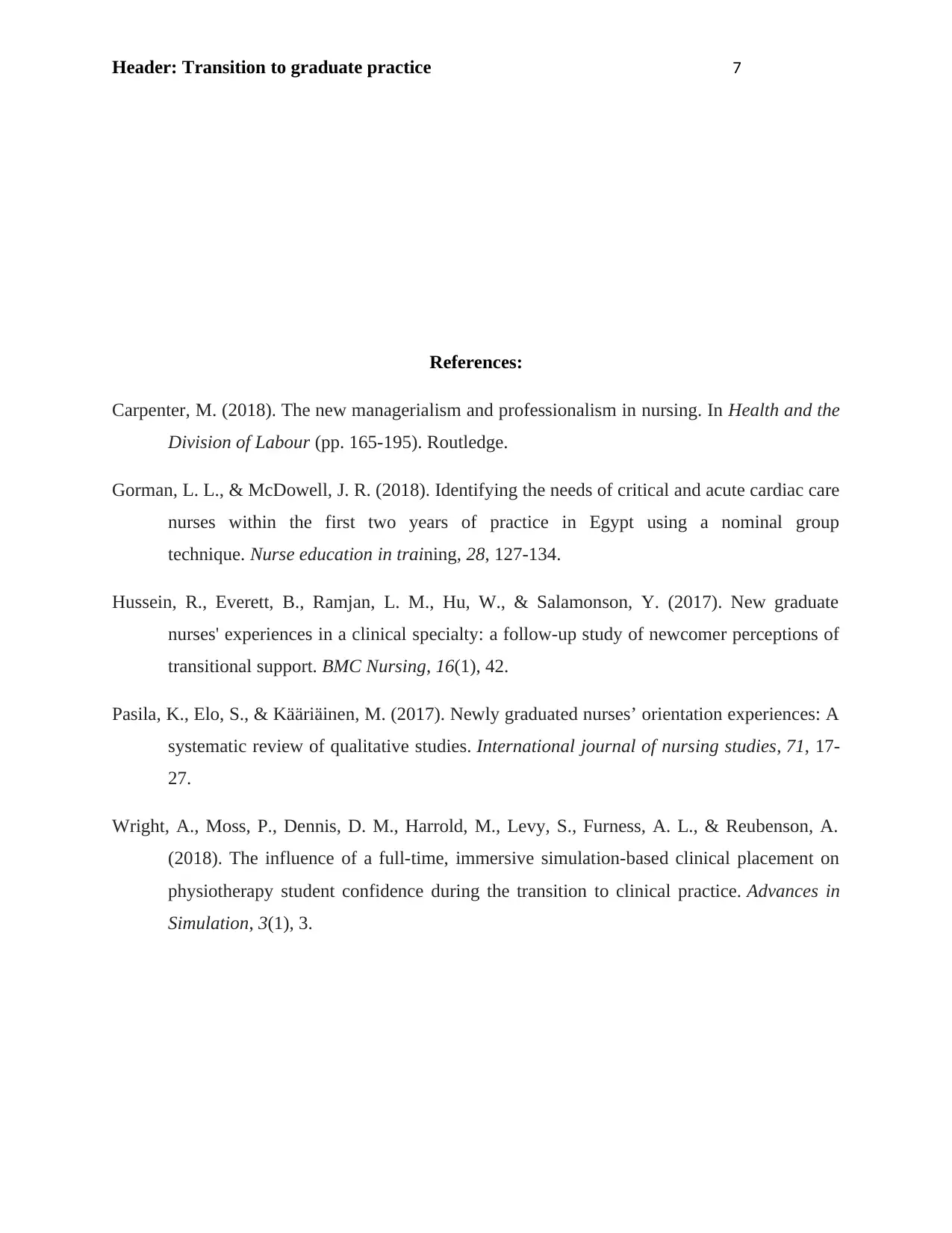
Header: Transition to graduate practice 7
References:
Carpenter, M. (2018). The new managerialism and professionalism in nursing. In Health and the
Division of Labour (pp. 165-195). Routledge.
Gorman, L. L., & McDowell, J. R. (2018). Identifying the needs of critical and acute cardiac care
nurses within the first two years of practice in Egypt using a nominal group
technique. Nurse education in training, 28, 127-134.
Hussein, R., Everett, B., Ramjan, L. M., Hu, W., & Salamonson, Y. (2017). New graduate
nurses' experiences in a clinical specialty: a follow-up study of newcomer perceptions of
transitional support. BMC Nursing, 16(1), 42.
Pasila, K., Elo, S., & Kääriäinen, M. (2017). Newly graduated nurses’ orientation experiences: A
systematic review of qualitative studies. International journal of nursing studies, 71, 17-
27.
Wright, A., Moss, P., Dennis, D. M., Harrold, M., Levy, S., Furness, A. L., & Reubenson, A.
(2018). The influence of a full-time, immersive simulation-based clinical placement on
physiotherapy student confidence during the transition to clinical practice. Advances in
Simulation, 3(1), 3.
References:
Carpenter, M. (2018). The new managerialism and professionalism in nursing. In Health and the
Division of Labour (pp. 165-195). Routledge.
Gorman, L. L., & McDowell, J. R. (2018). Identifying the needs of critical and acute cardiac care
nurses within the first two years of practice in Egypt using a nominal group
technique. Nurse education in training, 28, 127-134.
Hussein, R., Everett, B., Ramjan, L. M., Hu, W., & Salamonson, Y. (2017). New graduate
nurses' experiences in a clinical specialty: a follow-up study of newcomer perceptions of
transitional support. BMC Nursing, 16(1), 42.
Pasila, K., Elo, S., & Kääriäinen, M. (2017). Newly graduated nurses’ orientation experiences: A
systematic review of qualitative studies. International journal of nursing studies, 71, 17-
27.
Wright, A., Moss, P., Dennis, D. M., Harrold, M., Levy, S., Furness, A. L., & Reubenson, A.
(2018). The influence of a full-time, immersive simulation-based clinical placement on
physiotherapy student confidence during the transition to clinical practice. Advances in
Simulation, 3(1), 3.
1 out of 7
Related Documents
Your All-in-One AI-Powered Toolkit for Academic Success.
+13062052269
info@desklib.com
Available 24*7 on WhatsApp / Email
![[object Object]](/_next/static/media/star-bottom.7253800d.svg)
Unlock your academic potential
Copyright © 2020–2026 A2Z Services. All Rights Reserved. Developed and managed by ZUCOL.





